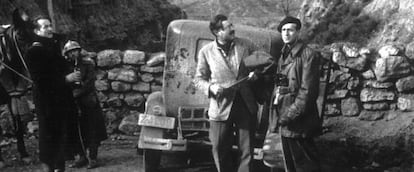When Franco went to Hollywood
Dictators’ diplomats pressurized studios into censoring Hemingway adaptations

The contempt was mutual. But Franco took his disdain for author Ernest Hemingway so far as to get his foreign service to change the script of a Hollywood adaptation of For Whom the Bell Tolls, the most Spanish of the writer’s novels.
Douglas LaPrade has spent years researching Hemingway and his relationship with Spain at the University of Texas-Pan American in Edinburg, Texas. The results of his studies have appeared in several books, including Hemingway Prohibido en España, Hemingway & Franco and The Censorship of Hemingway in Spain, which was his doctoral thesis in 1988 — almost all of them published by Biblioteca Javier Coy, a collection named in honor of one of the great Spanish specialists in English-language literature.
The censors used the Spanish ambassadors and consuls in the United States, LaPrade explains on a visit to Madrid. Above all they insisted on semantic matters: they didn’t want the words “Falangist” or “fascist” to be heard, having them replaced with “Nationalist.”
“And where Hemingway spoke of ‘Republican loyalists,’ Franco’s delegates got them to say ‘Reds’,” he says.
It is notable that the Hollywood studios were keen to please Franco”
“It’s notable that the Hollywood studios were keen to please Franco,” LaPrade notes. In fact, in the United States, “many people supported him; they didn’t want another enemy in Europe. Bear in mind that the war against Hitler and Mussolini was already underway and they didn’t want to open another front.”
That was in 1942. Ten years later, staff working for Senator Joe McCarthy’s witch hunt also laid into the film version of Hemingway’s short story, The Snows of Kilimanjaro, which was directed by Henry King and starred Gregory Peck, Susan Hayward and Ava Gardner. “They returned to mutilating, according to the wishes of the Francoist diplomats, what Republican elements there were in this new adaptation.”
Consul José Pérez del Arco told the Spanish ambassador to the US, José Félix de Lequerica, that: “Having observed that the script retains, as was expected, the old terminology of ‘loyalists’ and ‘rebels,’ and presents the Spanish red zone in the traditionally distorted manner, as has been presented in multiple novels and films in this country, I have made a series of corrections to the script, with the objective of focusing it on historical truth.”
Franco’s diplomats had attacked For Whom the Bell Tolls, released in 1943 and starring Gary Cooper and Ingrid Bergman, with the same intention, and with the same success. The work was the biggest culprit, according to the censor, when it came to “distorting the historical facts” of the Spanish Civil War.
The fact that Franco was going after his scripts didn’t worry Hemingway at all, however. “He didn’t care. He had earned so much money; he was so famous,” says LaPrade, a Texan who arrived in Salamanca over 30 years ago to study the Renaissance.
“That was where I bumped into Javier Coy,” he explains. “Through him I realized the interest that there was here about North American literature and changed the direction of my work out of obsession. It was he who later drove me to write about Hemingway and about the censorship to which he was subjected by Franco.”
Tu suscripción se está usando en otro dispositivo
¿Quieres añadir otro usuario a tu suscripción?
Si continúas leyendo en este dispositivo, no se podrá leer en el otro.
FlechaTu suscripción se está usando en otro dispositivo y solo puedes acceder a EL PAÍS desde un dispositivo a la vez.
Si quieres compartir tu cuenta, cambia tu suscripción a la modalidad Premium, así podrás añadir otro usuario. Cada uno accederá con su propia cuenta de email, lo que os permitirá personalizar vuestra experiencia en EL PAÍS.
¿Tienes una suscripción de empresa? Accede aquí para contratar más cuentas.
En el caso de no saber quién está usando tu cuenta, te recomendamos cambiar tu contraseña aquí.
Si decides continuar compartiendo tu cuenta, este mensaje se mostrará en tu dispositivo y en el de la otra persona que está usando tu cuenta de forma indefinida, afectando a tu experiencia de lectura. Puedes consultar aquí los términos y condiciones de la suscripción digital.









































